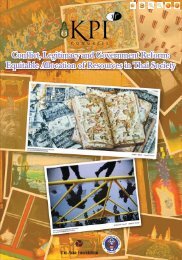SUFFiciENcy EcONOMy ANd GRASSROOtS DEvElOPMENt
SUFFiciENcy EcONOMy ANd GRASSROOtS DEvElOPMENt
SUFFiciENcy EcONOMy ANd GRASSROOtS DEvElOPMENt
Create successful ePaper yourself
Turn your PDF publications into a flip-book with our unique Google optimized e-Paper software.
The Meaning of Sufficiency Economy <br />
International Conference<br />
205<br />
wandered around to practice meditation a century ago. Hundreds of monasteries<br />
proceeding AjannMun’s Buddhist forest tradition, have been formed by his monk<br />
disciples all over this area. For this reason, it is not an overstatement to claim that<br />
people there know, with no need for further clarification, what mindfulness is.<br />
This study found that mindfulness is the fundamental quality of one’s mind to<br />
develop “Sufficiency”. Metaphorically, mindfulness is a gate keeper who watches<br />
over senses that pass six gates. Those gates are eyes, ears, nose, tongue, touch and<br />
mind. Mindful mind can separate the desires and physical needs apart. Consuming<br />
according to physical needs but not by desire, in the Buddhist point of view, is the<br />
wisdom-driven life. One’s level of mindfulness can be explored via money<br />
expenses. People with higher levels of mindfulness tend to buy things because of it<br />
is need, not by desires. Moreover, monitoring one’s expense list is believed to be the<br />
activity to gain the awareness of spending money. During the data collection, several<br />
government campaign programs promoting household expense recording were<br />
enacted.<br />
In order to adopt the Inpaeng concept efficiently, one needs a certain level of<br />
mindfulness or, in plain language, needs to have a strong-minded in order to<br />
overcome the money-driven lifestyle. The Inpaeng proposed the changing notion of<br />
“money as the core of everything” or “money leads wisdom” into “wisdom leads<br />
money”. They proposed the changing of “money as a goal of working” into<br />
“sufficiency and self-dependency as a goal of working”.<br />
During the data collection period, a project called “start jotting down to wipe<br />
out poverty” (Thai: พอเริ่มจด ก็เลิกจน), initiated by the Bank of Agriculture and<br />
Agricultural cooperatives (BAAC), was launched. BAAC promoted expense<br />
recording behavior to farmers’ families. Recording family expenses might be the<br />
best way to monitor and control money spending. The family financial record<br />
activity has been observed in Inpaeng communities.<br />
The Inpaeng network has provided its members with some reinforcing<br />
structures to have a sufficient life, in term of money management. Many community<br />
saving groups or local banks have been established in Inpaeng villages. Despite the<br />
offering of lower interest rate loans, the main objective of these saving groups is<br />
promoting a monthly household saving scheme. Members are encouraged to give<br />
their word of honor for saving a certain amount of money each month. Unlike a<br />
bank, these saving groups work as hosts for group meetings for monthly deposits,<br />
rather than for individual financial inquiries. Once a month, all members meet in<br />
community halls and deposit money into their account. This research found the<br />
meetings were a chance for saving group members to meet and exchange their<br />
stories of money management. It is the best chance to evaluate one’s financial<br />
situation by comparing to neighbours living in the same village, and generally,<br />
ranking in the same socio-economic status. The meetings are a chance to exchange<br />
and learn from each other.<br />
Participating in merit (Pali: puñña, Thai: บุญ)ceremonies (Thai: งานบุญ); can also














